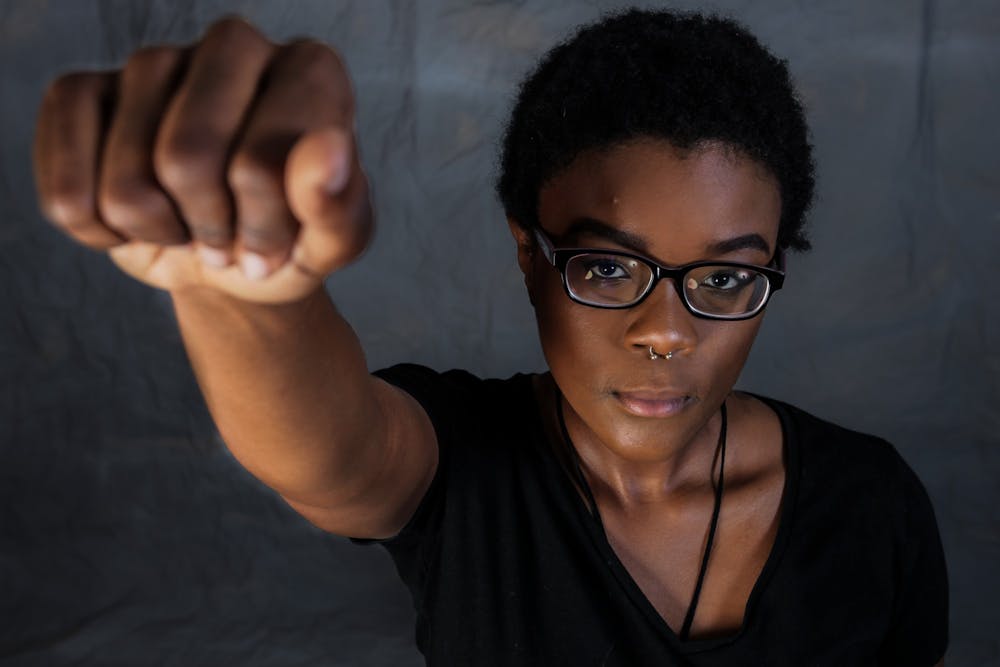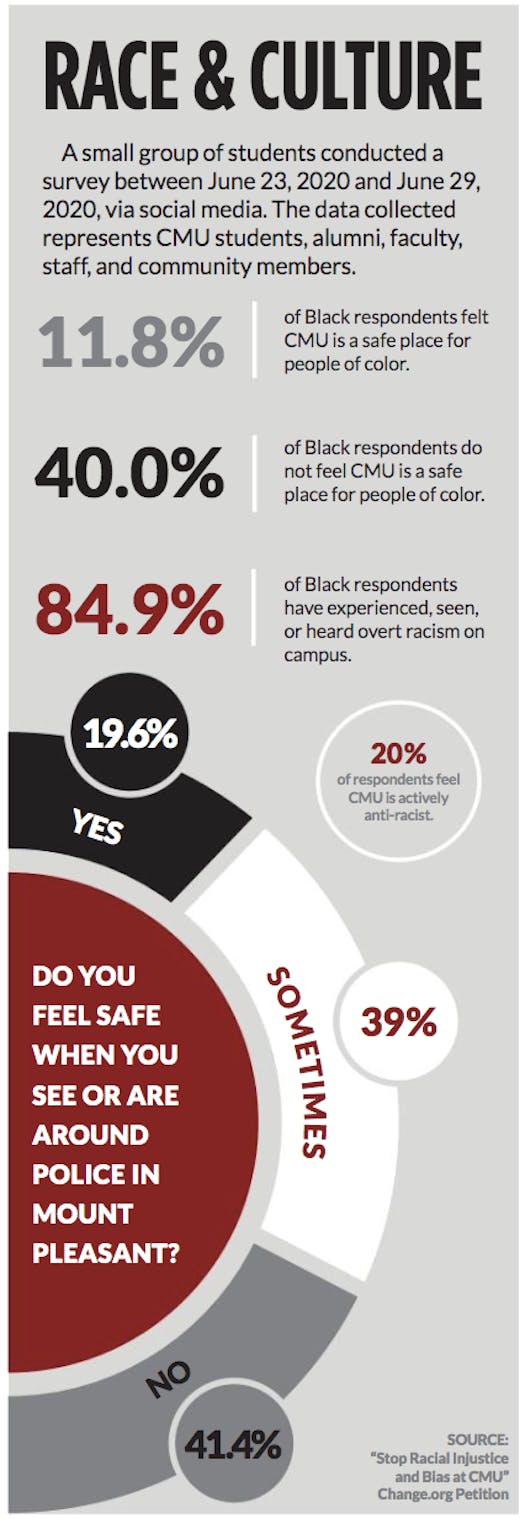Working towards change: Students, alumni petition for CMU to work toward racial justice

Portage senior Amethyst Stewart:
"Don't let fear of repercussions keep you silent. Your voice matters."
Throughout her time in Mount Pleasant, Ahsha Davis has been called phrases she will not repeat, been the first Black person some people have ever met and has watched as movements for racial injustice have started with no resolution.
The Detroit graduate student said when she arrived at Central Michigan University in 2015 there was a higher number of students of color, specifically Black students. More students were involved on campus, too.
“Now, we have a very good population of students of color. When I was here as a freshman, I saw them in positions, I saw them going to do things. Now I don’t really see that as much,” Davis said. “I think a lot of that has to do with the way CMU markets sometimes, how they tell people to come here. You have to show people there is diversity.”
Sociology faculty member Mary Senter said that there have been different times on campus where student activism has been more abundant and times where it has not been.
“We have a tendency as Americans to think the world is linear, that things are progressing towards some positive point. That’s just not how things have been going at CMU,” Senter said. “There have been periods of time where students have been more active and student activism on many issues, but certainly student activism dealing with racial injustice has been a very positive thing.”
After experiencing and witnessing instances of racism, Portage senior Amethyst Stewart said she would like to see CMU condemn those situations the same way they would with any other negative student behavior.
“In the Student Code of Conduct, if you get an alcohol violation or drug violation, there is an outline of exactly what happens,” Stewart said. "CMU doesn’t have that when someone is actively racist towards other students or committing a hate crime, using hate speech. I would really like to see clear protocol for hate speech and hate crimes.”
Davis and Stewart are two members of the CMU Racial Injustices Reform Committee that started in June during the nationwide conversation about Black Lives Matter and racism. The committee released a call for on action to social media on Aug. 26. Within the call for action, they developed a set of goals for the university to complete by the end of September.
Some of the goals include a commitment from CMU administrators to become anti-racist, mandated external anti-racism training, to have SOS forms ask if professors are prejudiced or racist and for annual diversity report cards.
“This is a moment in time where for the first time the administration is actually somewhat listening to the students of color on campus,” said Georgia senior Anthony Wilson. “If we wait, then this going to get pushed under the rug like a lot of other issues on campus. That’s why I believe it is so urgent for (the September goals) to pass now.”

The committee conducted the “CMU Reform Feedback Survey” by distributing the form June 23-29 on social media. The survey received 1,106 responses from students, alumni and faculty. The survey showed that 11.8 percent of Black respondents and 14.9 percent of all respondents feel that Central Michigan University is a safe place for people of color.
Responders were given the opportunity to mark more then one ethnic demographic that they identify with.
“(Results of the survey showed) 82.4 percent responded as white, 13.7 percent Black, 6.1 percent Hispanic/Latino, 2.3 percent Asian, 2.3 percent indigenous Americans, one percent Middle Eastern," Stewart said. "That was pretty representative of the CMU population as a whole.”
Davis said the survey results also showed her how white students view CMU versus how students of color view it. She didn’t realize that white students also have noticed that the university is not a safe place for people of color.
“I’ve had some great experiences, and I’ve had some bad ones, but I never understood the full capacity of how unsafe people felt,” Davis said. “It was just really interesting to see how other people have also felt some of the experiences I’ve felt.”
After collecting the survey data, the students and alumni on the committee developed 24 requests for action and created the “Stop Racial Injustice and Bias at CMU” Change.org petition.
“Since 2015, BIPOC within CMU has not been adequately studied or cared for by the institution,” the petition states. “CMU has allowed its institutional silence to become violent by not following up on reports of racial injustice and not continuing to gather research concerning the racial climate of CMU. The white supremacy allowed to permeate through CMU culture has also largely impacted the students of color at the institution.”
Stewart said that many of the ideas for the requests for action were inspired by the Office of Institutional Diversity, Equity and Inclusion's "The 2008 Strategy Plan for Advancing Diversity: Blueprint for the 21st Century and Beyond" plan.
“In that plan, they talk about five key points,” she said. “It starts with making diversity work at CMU and how it is based off of compositional dimensions, inclusive and exclusive practices, psychological things, behavioral, organizational and structural things.”
Although Stewart and many other students of color at CMU have seen the need for these calls for action during their time at the university, she said the committee began in June as alumni and students began to share their experiences at the university during the insurgence of the Black Lives Matter campaign.
With the support of their fellow students of color, alumni and allies, the group truly began with the help of a graduate student. Stewart and Davis helped start the committee after responding to a tweet from Waterford graduate student Autumn Gairaud who saw the need for the group after President Bob Davies released a statement about the need to address racism at CMU on June 14.
“I promise that we will do better,” Davies’ statement reads. “We must acknowledge our history before we can create a better future. And while it is an impossible task to fully eradicate racism and hatred from every heart, it is possible and necessary for us to improve CMU.”
Due to her strong feelings on Davies’ words, she reached out to him and he offered to speak with her.
“I decided to send out the tweet because this is something I’m passionate about and always want to stand in solidarity with but if I was going to be given a chance to talk to administration, I wanted to use that as a way to raise the voices of Black and brown students on our campus,” she said. “A ton of people reached out and then it kind of ended up being a smaller group that really stuck with it and ended up meeting with President Davies and creating the petition.”
Gairaud said the statement from Davies made her realize the need for CMU to actively make the steps to move forward and better itself.
“That was more of a strong statement than anything I’ve ever seen during my time at CMU, and I did my undergrad here as well,” Gairaud said. “In some ways I was impressed by it and in other ways I was like, 'What are we going to do? What are the action steps?'”
After becoming a committee, creating the survey and sifting through the results, the students met with Davies to present the data and talk about potential next steps.
On July 13, the group met with Davies and CMU Police Department Chief Larry Klaus over Webex to discuss the survey and their experiences. They discussed what the university and CMUPD could do to help minimize and eliminate racial injustice.
“(Davies) was very open to our conversation and was very interested in learning about what we learned from the survey” Davis said. “He actually thought the survey was done very well, that it was worded beautifully and that we got a really good response. He also talked about how there are some things in the survey he definitely wanted to (focus) on and make sure we try to implement in the year.”
Davies said that he thinks the ideas suggested are excellent to helping CMU become more inclusive. He mentioned that some of the 24 requests may take longer than the suggested timelines, while others may be implemented earlier.
"One of the most important requests was for data and reporting," Davies said. "At the most recent cabinet meeting, we made the decision to conduct a 360-degree Student Equity Audit with the firm EAB, which will help us establish a clear picture of where we are today and empower us to set specific goals for where we need to be moving forward."
In order to keep that dialogue going, the committee hopes to meet with Davies monthly for progress reports on the calls for action.
"I don't foresee us saying, 'alright, this is not happening we'll leave it alone,'" Davis said. "People do that all the time. We aren't doing that at all."



